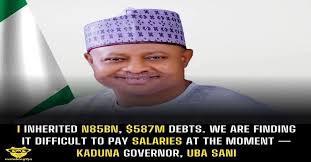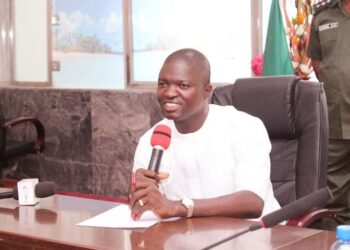Governor Uba Sani of Kaduna state has explained why the state workers’ March salaries were delayed, noting that his administration inherited a debt burden of $587 million, N85 billion, and 115 contractual liabilities from the previous administration.
The governor who disclosed this while addressing a Town Hall meeting in Kaduna on Saturday, said, though he has not borrowed a single kobo since he came on board nine months ago, the huge debt burden is eating deep into the federal allocation accruing to the state, adding that of the N10 billion that was allocated to the state in March, N7 billion was deducted at source for debt repayment.
Governor Sani lamented that due to the rise in the exchange rate, Kaduna state is now paying back almost triple of what was borrowed by the previous administration of Nasir el-Rufai.
He explained that following the deduction of N7 billion to service the state’s debt in the month of March, the state was left with N3 billion, which is not enough to pay salary, as the state’s monthly salary bill stands at N5.2 billion.
He assured that despite the debt, his administration remains resolute in steering Kaduna state towards progress and sustainable development.
The governor said, “despite the huge debt burden of $587 million, N85 billion, and 115 contractual liabilities we sadly inherited from the previous administration, we remain resolute in steering Kaduna state towards progress and sustainable development. We have conducted a thorough assessment of our situation and are sharpening our focus accordingly. It gladdened my heart to inform you that despite the huge inherited debt on the state, till date, we have not borrowed a single kobo.
“The Key priority areas of our government include safety and security, housing, education, healthcare, and support for Micro, Small, and Medium Enterprises (MSMEs). We are also prioritizing inclusive development by investing in human capital, stimulating the economy, and providing affordable housing.”
Governor Sani highlighted some of his administration’s top priority for 2024, to include; safety and security, infrastructural development, education development, house and urban development, social intervention and investment drive among others.
On security, he said the state has revamped the Kaduna State Vigilance Service (KADVS) by recruiting 7,000 additional personnel for the service, while over 100 operational vehicles and 100 motorcycles have been procured for distribution to KADVS and the other security agencies in the state.
In the area of education, Sani said aside the establishment of three skills and vocational cities to address skills deficits in the state, his government in collaboration with Kuwait is working to reduce out of school children in Kaduna by 200,000, adding that the four year program which will start in May or June 2024, is a $62 million project that will build 102 new schools in Kaduna and renovate 170 existing ones within four years.
The governor said that despite the numerous challenges confronting the state, “our collective efforts are essential for Kaduna state’s progress. We aspire to make rural living enjoyable and transform Kaduna into a premier business hub. Our ultimate goal is to rebuild trust and foster peace and harmony”.
Addressing the event, former Chief of Defence Staff, General Martin Luther Agwai (rtd) urged efforts to address the security challenges facing the state, noting that without peace and security no meaningful development can be achieved.
He commended Governor Uba Sani for cutting cost of governance due to huge debt of the state, while tasking all residents to eschew political, religious or ethnic differences and support the state government in overcoming the debt challenge.
Emir of Zazzau, Amb. Ahmad Nuhu Bamalli, in his remarks, expressed optimism despite the challenges facing the state, adding that the governor has the capability to turn around the economy of the state for effective development, just as he pledged the support of all traditional rulers in the state to ensure that the Uba Sani administration succeeds.




